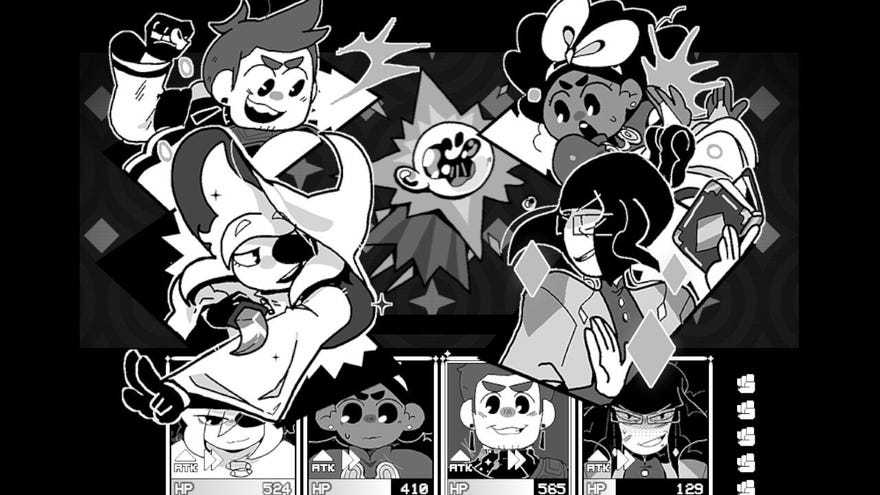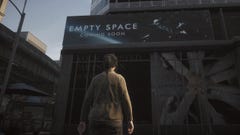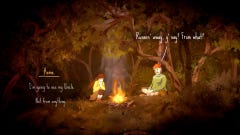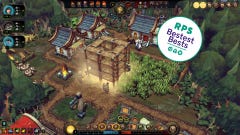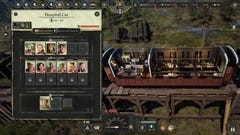In Stars And Time review: a grind of a groundhog day
Out of the loop
Have you ever felt like you're at least ten years too old to be playing certain video games? Whether it's the humour falling flat, or just the general hyperactivity of its main cast being a bit too much, there are some games out there that you can't help but bounce off. Hard. Alas, in the case of In Stars And Time, I've been thrown from its time-looping RPG trampoline with such violence that I now can't even look at it without breaking out into a sweat.
To its credit, there are lots of things In Stars And Time does very well despite my overall feeling of kinda hating its guts. It begins the night before a climactic battle that will decide the fate of the world - a moment that would normally come at the end of a traditional fantasy RPG, but here is the sole focus of the game's 20-ish hour runtime. As you might have guessed already, that moment becomes stretched and examined in fine, forensic detail thanks to a mysterious time-loop power thrust upon the aloof wizard of the group, Siffrin. They're the only one who's aware of what's going on in their little band of warriors, and it's them who has to deal with the horror of dying over and over again to an all-powerful, time-freezing King as they figure out how to break it.
In theory, the premise is a strong one, and through the conversations Siffrin has with the rest of their pleasingly diverse and LGBTQ+ party members, the game deftly draws out themes of dealing with rejection, failure, self-fulfilment, being good enough, fear of change and more. The result is a very modern and human-feeling cast of characters that are easy to warm to and spend time with. Some of their chats could, admittedly, do with some editing - this lot don't half like to rabbit on about anything and everything a lot of the time, and sometimes you just want them all to zip it so you can carry on with the story.
But while the game does have a skip function that allows Siffrin to, quite literally, "zone out" of stuff they've heard before, I always get the fear every time I feel the need to escape one of its more protracted and repetitive dialogue scenes. Not because I'm afraid of missing something important, but because there's a bug in the fast-forward system that forces a hard reset every time you encounter it - and when you're playing a time-loop game with no auto-save function, restarting a possibly quite old save file multiple times per hour is something that gets real old, real fast. (The speed options of its dialogue are also strangely finicky in a way that is perhaps only annoying to me, but it does make engaging with In Stars And Time's writing even more frustrating than it perhaps needs to be).
But even when I'm not tentatively dancing round the prospect of breaking my save, the entire structure of In Stars And Time's time-loop is one of infuriating tedium. Since this is set at the end of a trad RPG quest, the primary locations you'll encounter here are limited to the final town you'll pitstop at the night before, and the three-floor castle where the villainous King lives. At first, the mere act of climbing to the top of the castle is a trial in and of itself. You'll die multiple times, often on purpose to establish the rules of the time-loop, and it's the act of going through these motions again and again that really starts to grate.
The rules themselves are frustratingly inconsistent, too. You can carry over weapons and tonics every loop, for example, but not the souvenir items you gain from NPCs, the dungeon keys you need to unlock the copious numbers of doors on each floor of the castle. You can also carry over Siffrin's EXP and abilities between loops, but everyone else resets back to Lv.45 on a new loop, losing everything they've learned unless you equip them with a single 'memory' of one of their powerful abilities. The latter does sort of make sense from a narrative perspective, but the items (or indeed anything even vaguely useful that would help cut down the game's wearying repetition) feel particularly stingy. I suspect that's because there wouldn't be much of a game to play otherwise, but padding is padding at the end of the day, and its fussy 'this but not that' rules make it feel like it's constantly trying to wrongfoot you.
Even its engaging turn-based battle system can't help but feel like it's getting in the way a lot of the time, too. The battle system is quite an intriguing one on the face of it, taking the rock-paper-scissors equations of other RPGs to its literal extreme. Attacks fall into - you guessed it - rock, paper or scissor types, and you can suss out an enemy's strengths and weaknesses by simply gazing at the shape of their hands on the battle screen, which, yep, will either be flat, balled fists, or split fingers. It's a neat visual flourish that will raise a smile the first time you encounter it, and some of its sub-bosses offer some quite memorable twists on it to keep you on your toes. Similarly, if you hit an enemy with five attacks of the same type in a row, your party initiates a Persona-style group attack to really do some mega damage, and the dance of abilities you'll pull off in order to get there - using buffs to not disrupt the cycle, giving away turns to prioritise your strongest attackers - is frequently just as chewy and mentally stimulating as your Final Fantasys, Bravely Defaults and Octopath Travelers.
But much like In Stars And Time's excessive tracts of dialogue, the grind of simply getting through the game will soon make you want them to be over as quickly as possible. That, or you'll start wanting to avoid them altogether - provided you can dodge its infuriatingly quick, homing missile-esque sprites in its knuckle-bitingly narrow corridors. My frustration came to a head when exploring the second and third floors of the castle, where I'd regularly find myself down a dead-end, necessitating yet another loop back to the beginning of that floor and starting again. Several paths are blocked off unless you have a special item, you see, but you only get one of these per floor, and there's only one route that will lead you forward. Pick the wrong one, as I did frequently, and you're forced to both off yourself and loop back to the very start of that particular floor, meaning yet another monotonous lap to find X key to unlock Y door, which gives me Z key to unlock… you get the picture.
Eventually, you can pay to have all the doors unlocked when you start a new floor, but only once you've completed it in the first place, and only if you've fought its monsters enough times to have enough 'memory currency' to do so - and the cost of doing so per floor is surprisingly high. Honestly, at one point I deemed it quicker to fight one of the sub-bosses a second time than having to go through the rigmarole of faffing about with its menus again; never a state you want to get to in a chuffing time-loop game. And certainly not when you're constantly haunted by that dreaded dialogue skip bug, either.
Ultimately, the stars haven't aligned with this RPG, and I don't have the time or patience any more to put up with its tedious nonsense. It's a shame, really, as its turn-based battles can be very enjoyable every now and again, and its cast of cute weirdos are often quite endearing when they're not bleating on too long. Younger folks in their mid-20s may well argue that its characters are enough to carry them through the rest of the boring bits, but a halfway decent story does not a good game make for me. I need more sustenance in my old age, and for its time-loop to be more than just gristly, unsatisfying filler.
This review was based on a retail build of the game provided by publishers Armor Games Studios.
